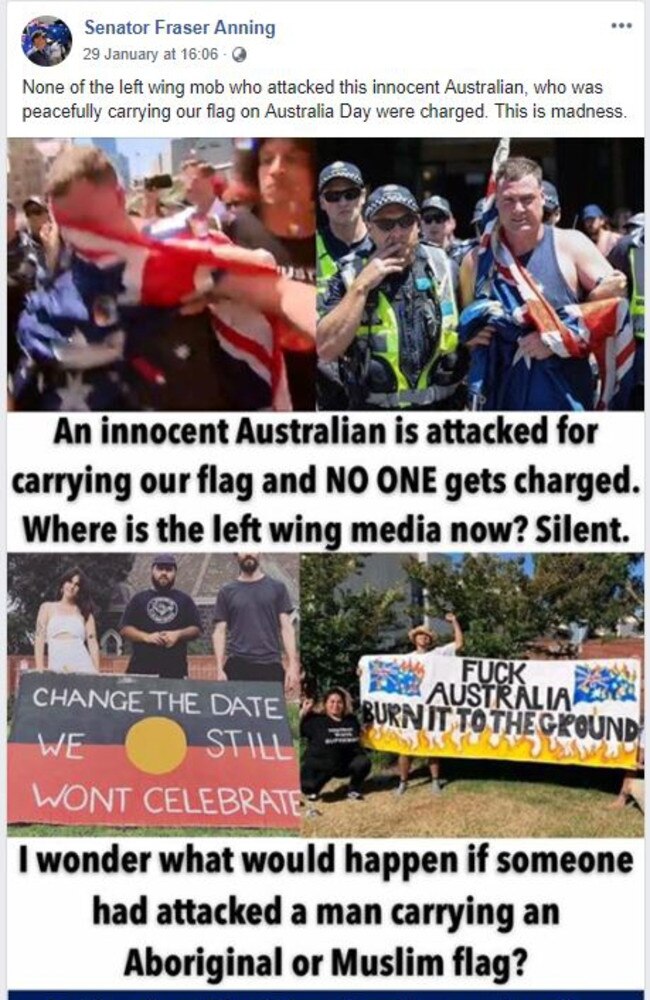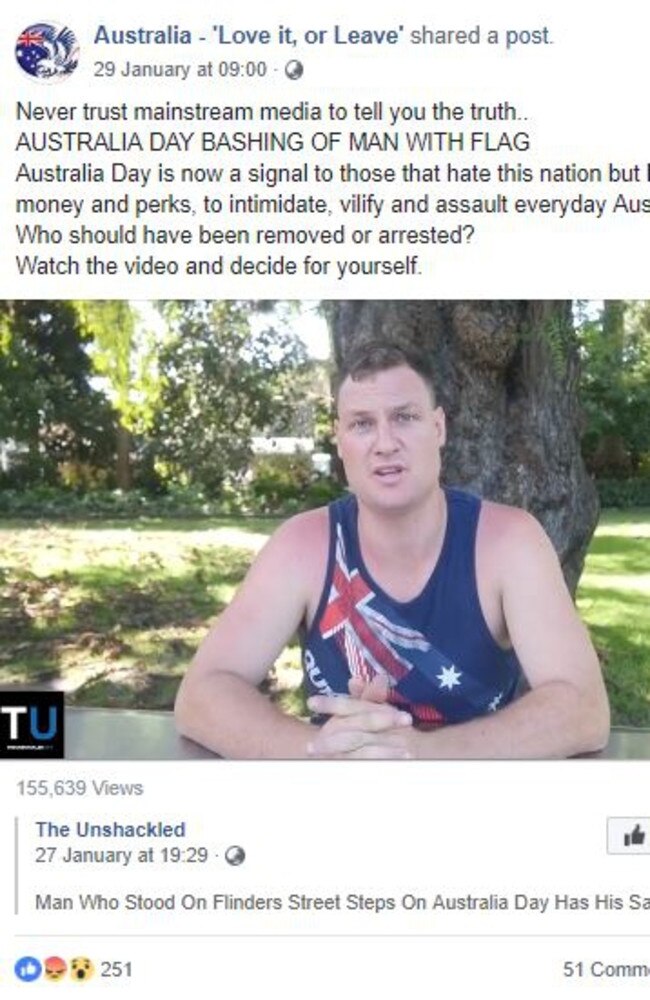Fake Facebook sites spreading political lies
Fake news is already infecting the 2019 election cycle with reports a man was “lynched” and “bashed” on Australia Day for wearing the Australian flag going viral.
Social
Don't miss out on the headlines from Social. Followed categories will be added to My News.
Fake news is already infecting the 2019 election cycle with reports a man was “lynched” and “bashed” on Australia Day for wearing the Australian flag going viral.
Controversial senator Fraser Anning shared claims a man had been attacked on Facebook to his 83,500 followers in an “authorised” post this week as it spread through a network of far right groups on social media.
It comes as experts predict the federal election will be Australia’s biggest fake news election ever and Labor urges Facebook to take responsibility for misinformation spread on its site.
The claim about an Australia Day attack was based on a clash between change-the-date protesters and so-called “patriot” Ricky Turner at the Invasion Day march in Melbourne.
Mr Turner was asked to leave the area by police when a fight broke out between him and a small group of activists. No one was charged.
A video focusing on the moment of the clash posted by fellow far right agitator Neil Erikson, the self proclaimed “biggest troll in Australia” who confronted former Labor senator Sam Dastyari in a pub last year, has already been seen more than 290,000 times on Facebook.
That’s about the same audience Channel 7’s Sunrise program gets on an average weekday morning from five capital cities.
MORE: Nats accepted $56,000+ in donations from tobacco industry
MORE: Australian government departments rack up travel bill

News Corp understands Labor is urging Facebook to establish a dedicated rapid response team to tackle complaints about fake news during this year’s campaign.
Shadow Communications spokeswoman Michelle Rowland did not comment on specifics but, following Facebook’s confirmation that it would be rolling out “additional protections” for Nigeria, India and the European Union for elections this year, she told News Corp: “Fake news is a significant threat to the health of our democracy and we all must be vigilant.”
“We expect major digital platforms to be doing all they can to combat misinformation.”
News Corp also understands the Australian Electoral Commission is in talks with Facebook about strengthening political advertising transparency for Australia ahead of the election.
Special Minister of State Alex Hawke said the deputy electoral commissioner had held talks with social media companies in January on a trip to Canada and the US.
It follows talks with the Australia and New Zealand arms of Facebook, Twitter and Google in 2018.

University of Canberra researcher Dr Mike Jensen told News Corp this year’s campaign would be a “playground” for groups seeking to sway voters with fake news.
“It’s the first election to come after the 2016 US election and a lot of groups around the world were watching what happened there. Basically, Russia created a playbook which other actors can pick up readily,” he said.
“I would expect to see this as a playground for both domestic and foreign actors to see what extent they can appropriate and adapt these tactics to the Australian context.”
Australian National University political marketing expert Andrew Hughes also predicted the May election would be a “tipping point” for fake news in Australia, adding that the “lynching” claim was a clear case of fake new which showed just how quickly it could spread.
“Lynching in most people’s minds is being strung up on a poll somewhere or a tree with a rope around your neck. I can’t recall that happening and I’d be horrified if it did happen in Australia,” he said.

Dr Hughes added that such blatant misinformation wouldn’t cut through to mainstream audiences but other, harder to identify, fake news could slip through as influence groups sought to sow distrust in major parties and democratic institutions.
Senator Anning, who has billed taxpayers thousands to attend far right rallies since entering parliament, declined to comment on the post or the Australia Day incident.
There is no law to regulate truth in electoral communications.
Meanwhile, an analysis by social intelligence and news agency Storyful Australia has identified Facebook pages like “Fair Suck Of The Sav, Mate”, “Australia — ‘Love it, or Leave”, “Save Australia” or right wing “news” site The Unshackled as “fertile ground” for fake news during the election.
The analysis by Storyful, which monitors about 180 political pages and fringe groups on Facebook, also reveals Senator Anning’s popularity has skyrocketed with his page receiving triple the number of “interactions” from punters than One Nation leader Pauline Hanson in January.
A 2018 digital news report by the University of Canberra found one in four Australians had already experienced fake news online and 67 per cent were concerned about it.
Mr Hawke said the government had updated electoral laws last year to boost political advertising transparency.


